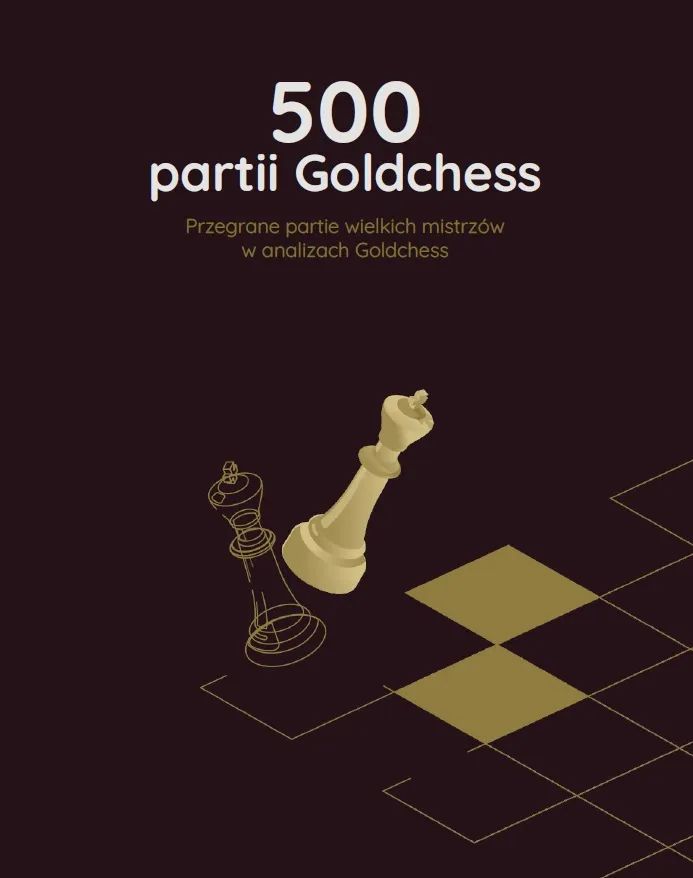|
|
| WIRTUOZI SZACHÓW - MAGNUS CARLSEN |
|
Wirtuozi szachów
Luty 2010
Wirtuozi szachów
Przychylamy się życzeniom wielu Internautów i wprowadzamy nowy temat pt. "Wirtuozi szachów". Będziemy tutaj przedstawiać Państwu sylwetki sławnych szachistów, zarówno przeszłości, jak i teraźniejszości.
Zaczynamy od Magnusa Carlsena, który ostatnio wprowadził szachy do szerokich mediów. To dzięki niemu o szachach zaczęto wiele pisać na łamach różnej prasy całego świata.
|
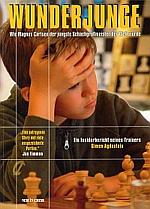 Niewielka Norwegia (około 4 800 000 mieszkańców), bez większych tradycji szachowych, doczekała się zawodnika wielkiej klasy. Magnus Carlsen http://pl.wikipedia.org/wiki/Magnus_Carlsen z niedużego miasta Toensberg (35 tys. osób) jest gwiazdą szachów światowych, ulubieńcem fanów i organizatorów wielkich turniejów. Niewielka Norwegia (około 4 800 000 mieszkańców), bez większych tradycji szachowych, doczekała się zawodnika wielkiej klasy. Magnus Carlsen http://pl.wikipedia.org/wiki/Magnus_Carlsen z niedużego miasta Toensberg (35 tys. osób) jest gwiazdą szachów światowych, ulubieńcem fanów i organizatorów wielkich turniejów.
Arcymistrz Lubomir Kavalek, który od wielu lat prowadzi kącik szachowy w "Washington Post", nazwał Norwega "Mozartem szachów". Na najnowszej liście rankingowej FIDE (01.01.2010) Carlsen znalazł się na pierwszym miejscu. Tym samym 19-letni Norweg stał się najmłodszym liderem rankingu w historii światowych szachów!
Magnus Carlsen ma jasny cel: zostać mistrzem świata! Ale to może stać się dopiero za dwa lata. Bowiem najpierw musi wygrać turniej kandydatów i potem pokonać zwycięzcę tegorocznego meczu Anand - Topałow.
Jak to się stało, że Magnus Carlsen w tak błyskawicznym tempie i w tak młodym wieku osiągnął szczyt w świecie szachowym? Jest to wynik tylko jego wielkiego talentu, czy pracy szkoleniowej? Uważam, że te dwa aspekty miały decydujące znaczenie w jego rozwoju. Magnus miał wielkie szczęście, że korzystał w początkowej fazie swej kariery z pomocy dobrego trenera. To właśnie arcymistrz Simen Agdestein udzielał mu cennych rad i przygotowywał wartościowe materiały szkoleniowe. Wynika to z książki pt. "Cudowne dziecko", którą przedstawiłem na tej stronie w dziale "Recenzje" w 2007 roku.
Po przestudiowaniu tej pracy i wywiadów z Carlsenem doszedłem do pewnych wniosków:
1. Magnus wyróżnia się świetną pamięcią. Swój talent w tym kierunku rozwija studiowaniem w głowie książek szachowych w języku angielskim, bez korzystania z figur i szachownicy. Rozwiązuje dużo wszelkiego rodzaju zadania (testy). W ten sposób rozwija technikę liczenia wariantów i poznaje ważne motywy pozycyjnej i kombinacyjnej gry.
2. Trener Simen Agdestein - w początkowej fazie szkolenia - przygotowywał mu zbiory ciekawych partii, także z dawnej praktyki turniejowej, które Magnus przeglądał w komputerze. Teorię debiutów studiuje przede wszystkim na bazie całych partii z nowoczesnej praktyki. Jego repertuar debiutowy jest bardzo szeroki. Dzięki temu poznaje wiele typowych pozycji o charakterze strategicznym i taktycznym. Studiując całe partie poznaje wszystkie jej fazy, co ułatwia mu rozgrywanie własnych pojedynków. W ten sposób studiuje też repertuar swoich przeciwników, co umożliwia mu znajdowanie słabych punktów w ich grze. Podkreślam, że młody arcymistrz trenuje przede wszystkim przy pomocy komputera. Podobno w jego domu nie ma normalnych szachów. W wypowiedziach Carlsena nigdy nie słyszałem, aby studiował dzieła Nimzowitscha, czy Dworeckiego. Magnus jest wychowany przede wszystkim na twórczości współczesnych mistrzów i arcymistrzów i korzysta z nowoczesnych środków szkoleniowych, czyli komputera i Internetu!
3. Od 2009 roku Magnus współpracuje z byłym mistrzem świata Garri Kasparowem. Mają głównie kontakt poprzez Internet. Spotykają się też bezpośrednio w celu analizy i omówienia najważniejszych problemów w zakresie stosowanych przez Carlsena debiutów. Kasparow ma wielki wpływ twórczy na Carlsena. Pomaga mu w opracowaniu optymalnego repertuaru debiutowego i udziela rad odnośnie stosowania odpowiednich otwarć lub wariantów przeciwko jego przeciwnikom. Były mistrz świata przygotowuje też nowe idee debiutowe, które młody arcymistrz wykorzystuje potem w swej praktyce turniejowej.
4. Od 2009 roku Magnus Carlsen poświęcił się całkowicie szachom, czyli został zawodowym graczem.
Zastanówmy się teraz krótko nad problemem polskich szachów. Możemy się poszczycić przeszło 100 medalami, które juniorzy i juniorki zdobyli na mistrzostwach świata i Europy. Mimo tego nie doczekaliśmy się żadnego zawodnika klasy Carlsena. Nie mamy nawet gracza, który byłby w pierwszej 50-ce na liście rankingowej FIDE. Naszych zawodników nikt nie zaprasza na silne turnieje, ponieważ reprezentują średni poziom europejski i mają niskie rankingi.
Jaka jest, więc tego przyczyna? Moim zdaniem system szkolenia polskiej młodzieży jest przestarzały i nie odpowiada duchowi czasu. W 1999 roku - w czasie mojej pierwszej sesji Akademii Młodzieżowej w Zakopanem - zaproponowałem nowe rozwiązania szkoleniowe. Nie było żadnego zainteresowania ze strony polskich szkoleniowców. Ale na dobrą sprawę nikt w Polsce nie chce, aby było lepiej. Przekonałem się o tym w czasie dyskusji na forum Polskiego Związku Szachowego w 2003 roku pt. "Akademia Szachowa unowocześniać czy nie?".
Ale tym zajmę się obszerniej na innych podstronach. Polecam Państwu: "Szkolenie", "Polemiki", "Problemy PZSzach" i wkrótce nowe tematy: "Akademia Młodzieżowa" i "Komputery w szachach".
Wybrane partie z repertuaru Magnusa Carlsena
1. Obrona sycylijska [B22] - Flotten - Carlsen (Gausdal 2000)
|
1. Książki o Magnusie Carlsenie
2. Andrzej Filipowicz: O tym się mówi... (Magazyn Szachista luty 2010)
3. Carlsen i Kasparow uzgodnili "strategię współpracy"
4. Kasparow i Carlsen w Oslo
|
1. Książki o Magnusie Carlsenie
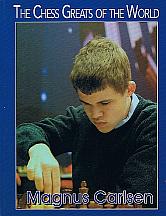 Wydawnictwo węgierskie Caissa Chess Books z Kecskemet specjalizuje się w publikowaniu małych biografii o wybitnych szachistach. W przedstawionej książeczce zamieszczonych zostało 48 niekomentowanych partii. Każda partia zawiera diagram z krytyczną pozycją i czytelnik ma możliwość znalezienia właściwej drogi do zwycięstwa. Wydawnictwo węgierskie Caissa Chess Books z Kecskemet specjalizuje się w publikowaniu małych biografii o wybitnych szachistach. W przedstawionej książeczce zamieszczonych zostało 48 niekomentowanych partii. Każda partia zawiera diagram z krytyczną pozycją i czytelnik ma możliwość znalezienia właściwej drogi do zwycięstwa.
|
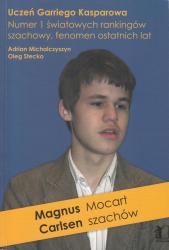

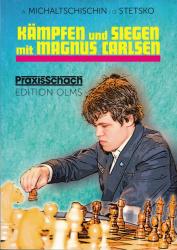
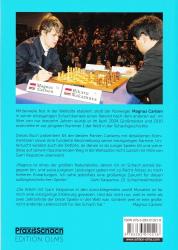 |
|
Do góry
|
2. Andrzej Filipowicz: O tym się mówi... (Magazyn Szachista luty 2010)
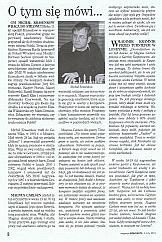 Do góry
Do góry
|
3. Carlsen i Kasparow uzgodnili "strategię współpracy"
Wiadomość o współpracy Magnusa Carlsena i Garri Kasparowa była jesienną sensacją minionego roku. Wspólne kontakty najlepszego szachisty wszechczasów i geniusza królewskiej gry przyniosły znakomite owoce: Carlsen wygrał turnieje w Nanjing, Londynie, Wijk aan Zee i został mistrzem świata w grze błyskawicznej. Na liście rankingowej FIDE zajmuje pierwsze miejsce.
W toku treningów Carlsen i Kasparow współpracowali ze sobą poprzez Internet i w trakcie bezpośrednich spotkań. Teraz wygląda na to, że ich drogi się rozeszły. Na wspólnej konferencji prasowej obaj podali do wiadomości, że Magnus Carlsen przejmuje swoją karierę we własne ręce. Ale wspólny kontakt nie zostanie zerwany i Kasparow jest dalej gotowy udzielać wskazówki, jeśli będzie taka potrzeba (na podstawie Chessbase news).
Press release - March 4th, 2010
With goals met, chess greats Kasparov and Carlsen alter strategy for 2010
The cooperation between former World Champion Garry Kasparov and Norwegian chess prodigy Magnus Carlsen began in early 2009. Kasparov, arguably the greatest player in the history of the game, and the 18-year-old Carlsen, one of the most remarkable talents in chess today, conducted two short training sessions in the spring and trained together for a fortnight in Croatia in the summer. There followed sessions in Oslo and Marrakesh (Morocco), accompanied by real-time Internet conferences during major tournaments in which Magnus was participating.
The result of this cooperation was most satisfying: on January 1st, 2010, just a month after his 19th birthday, Magnus Carlsen was listed as the top-ranked player in the world by the International Chess Federation (FIDE), the youngest ever to achieve this distinction. On the March 1st list he remained in the number one position with a rating of 2813 and became the second highest rated player in history, exceeded only by his mentor Garry Kasparov.
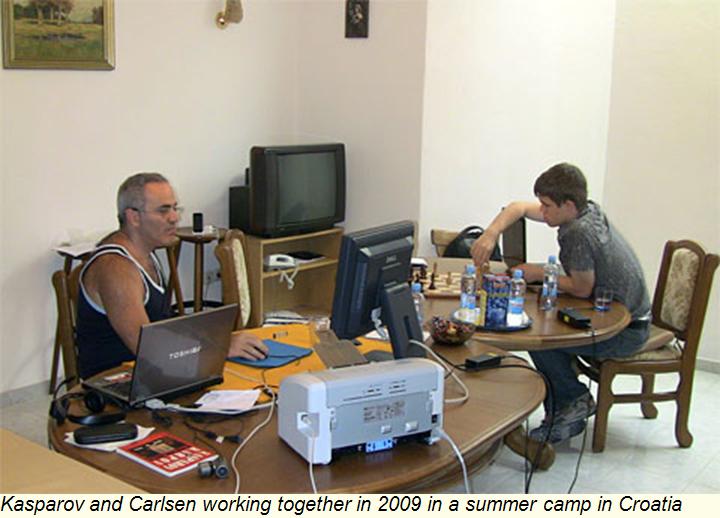
With those achievements a major target has been met in the cooperation between these two chess players, even earlier than anticipated. Therefore it has been decided that their cooperation should take a different direction this year. Magnus will be responsible for all career decisions, without constant guidance, as this is the natural next stage in his chess development. For the time being there are no plans for chess camps or regular coaching during events. Garry Kasparov and Magnus Carlsen have agreed to remain in contact, and Carlsen will still have the opportunity to confer regularly with Kasparov.
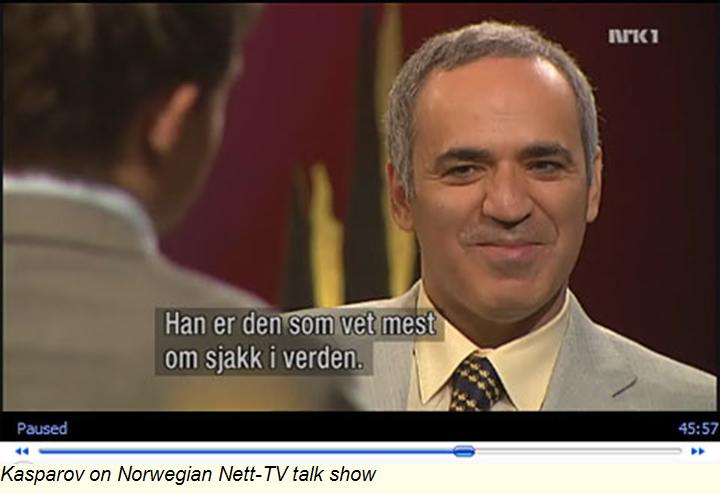
Garry Kasparov: "Magnus is one of the greatest natural talents I have encountered in chess, and his recent performance has exceeded even my very high expectations. Our time together our training camp sessions has been deeply invigorating for me as well. It was because of these sessions that I felt confident to play the anniversary match against Anatoly Karpov in Valencia last September with good results, I might add. It was also very gratifying for me to see Magnus climb to the world s number one position well ahead of our original schedule. Magnus has shown the deadly instincts of a great champion. During his tournaments, when we spoke about upcoming games, Magnus always wanted to play the sharpest and most dangerous continuations, an illustration of his increased confidence in his powers. Our work together during the past year in Croatia, Oslo and Marrakesh gave him a great deal of ammunition which, even when it was not used, helped him go into battle with the indispensable belief that he should expect to win every time he comes to the board.
I see a great future for this extraordinary player."
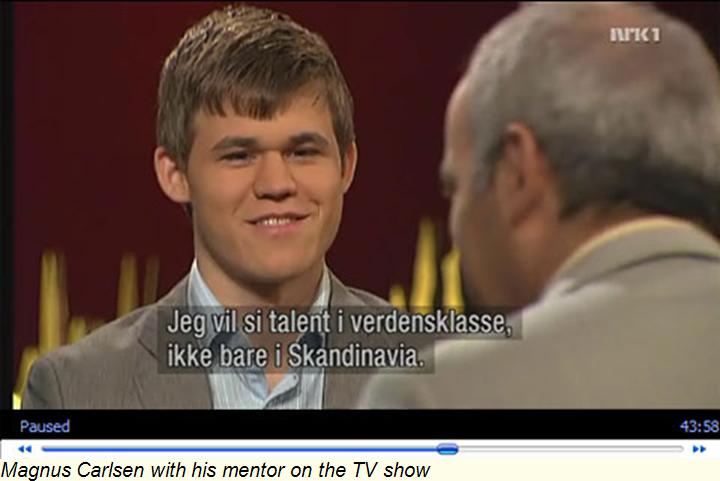
Magnus Carlsen: "Working with Garry Kasparov over the last twelve months has been a unique experience. Not only because he was the strongest player in the world for more than two decades, but also because of his great and never-ending passion for chess. I m very satisfied with our cooperation. Discussing the most topical openings with the one who invented a lot of the modern concepts of chess and getting advice on my particular opponents, most of whom he himself played against on numerous occasions, has been highly interesting and very helpful. Our work contributed significantly to my progression to the number one spot on the FIDE rating list this year."
Do góry
|
4. Kasparow i Carlsen w Oslo
W dniach 26-29.04.2010 odbyła się w Oslo konferencja ważnych osobistości, które w swoich krajach angażują się w walce o prawa człowieka. Polskę reprezentował Lech Wałęsa.
Były mistrz świata Gary Kasparow zreferował sytuację w Rosji. Oprócz tego spotkał się ze swoim podopiecznym Magnusem Carlsenem. Norweski kanał telewizyjny NRK TV przygotował z tej wizyty specjalne sprawozdanie.
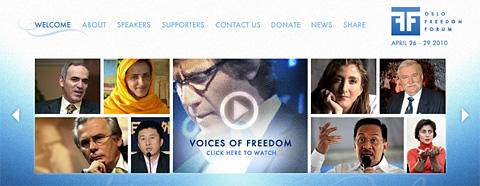
Last week Garry Kasparov was at the Oslo Freedom Forum, a conference on human rights, where the former World Champion spoke about human rights and democracy in Russia. The organisers have announced that there would be video updates over the next few weeks as they upload conference videos and photos so keep an eye on the Kasparov page there if you want to hear his speech. There is a link to a well-know 2008 interview with Sir David Frost, in case you have missed that. Incidentally, an official visit by the Russian President Dimitry Medvedev started on the same day, and the fact that Medvedev and Kasparov even stayed in the same hotel probably led to even more media attention than Garry expected.
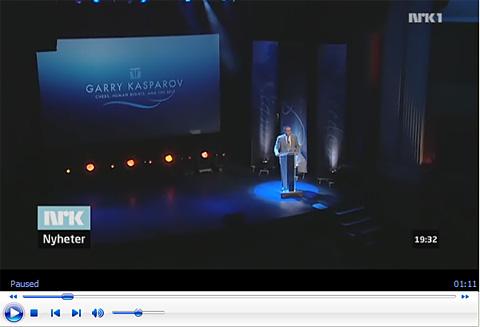
But Kasparov was in Norway not just for the Freedom Forum. He was greeted at Oslo's Gardermoen airport by his friend and colleague Magnus Carlsen, whom he has trained in the past. Kasparov participated in an event with one of Magnus's two main sponsors, the law company of Simonsen, which has published nice blog reports on their national chess hero in the past. They also sent Magnus to Bergen to play blitz at their recruiting exhibition stand. Simonsen promised a permanent job to any student who could beat him, but based on the outcome of the 26 games," Magnus said, "they will have to select a different criteria for recruiting." The opposition varied from beginners up to one grandmaster. TV 2 and other media covered the event, and the sponsor was very satisfied with the atmosphere and attention.
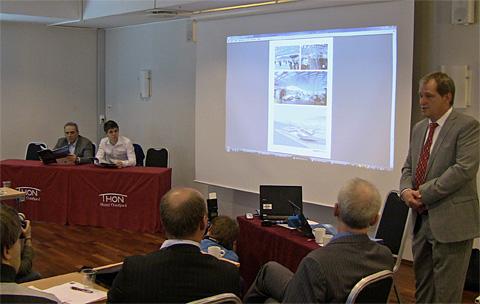
Kasparov and Carlsen at the meeting centered around the Tromso Olympiad bid for 2014. The speaker is Joran Jansson, the president of the Norwegian Chess Federation.
On Thursday Magnus and Garry attended a press conference in Sandvika to promote Tromso's candidacy for the Chess Olympiad in 2014. The Arctic Circle city of Tromso and Albena, Bulgaria are the two candidates that have delivered bids. "I really hope that the FIDE congress will vote for Tromso at their meeting in Khanty Mansiysk during the 2010 Chess Olympiad the coming fall," Carlsen said.
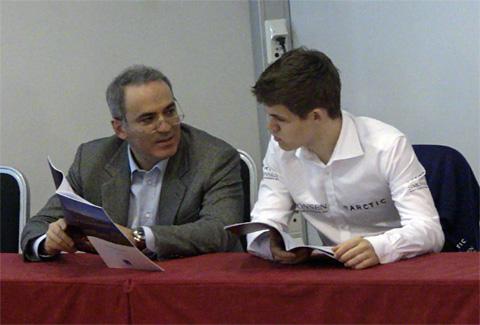
Garry and Magnus, a powerful force in the chess world today
Later the same day Kasparov and Carlsen attended Simonsen's annual client event. The former World Champion was the main speaker at this informal and popular gathering. He was interviewed by TV journalist Gro Holm, and NRK Lordagsrevyen interviewed Carlsen and covered the event in the double portrait televised nationally that weekend. Here is the report on NRK's web site. You can watch it on the player at the bottom of the page.
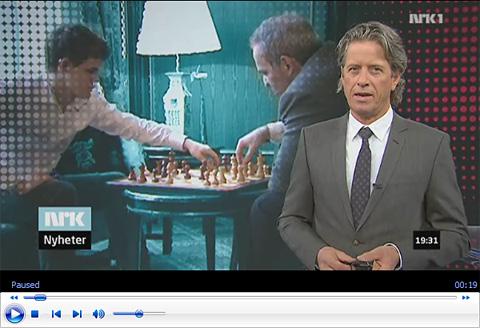
Carlsen and Kasparov on Norway's NRK TV
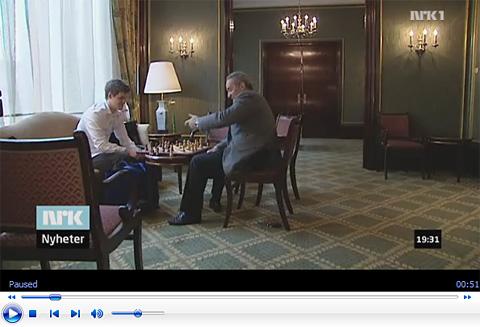
The two analyse in the hotel suite animated and with obvious pleasure
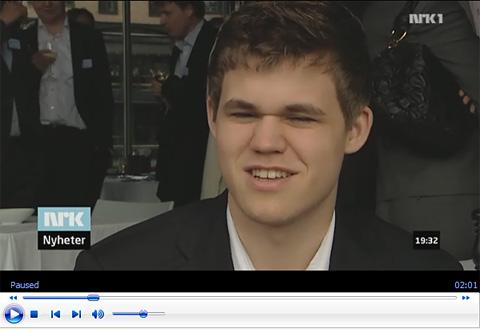
"Although I like to be updated on political issues I seldom feel really engaged emotionally."

"He is 19, I am 47. When I was 19 I was also only a chess player."
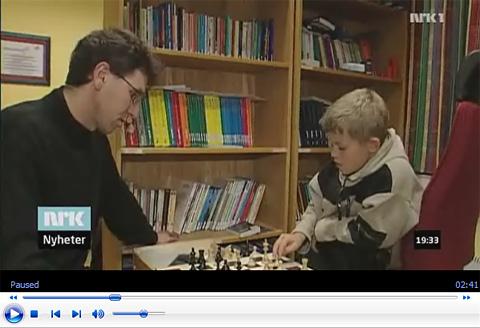
An infant Magnus working with GM Simen Agdestein
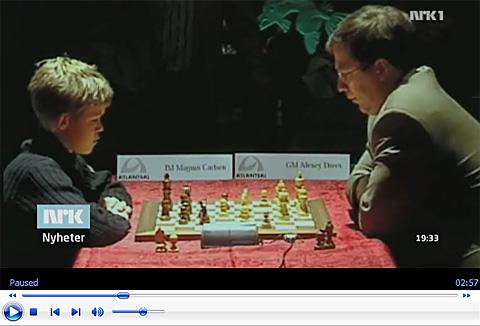
The young chess prodigy playing the 2600+ GM Alexey Dreev...
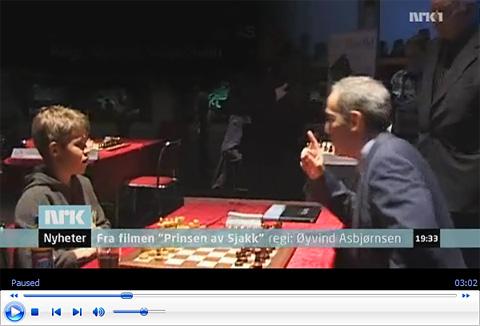
...and a first encounter with Garry Kasparov, whom the 13-year-old had on the ropes
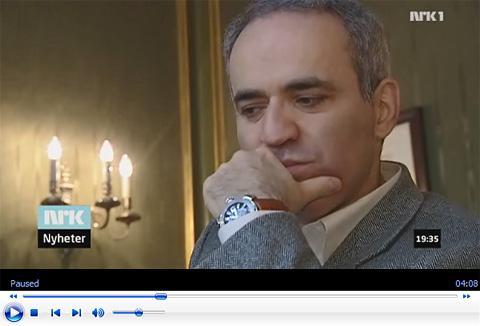
"Right now I believe that Magnus Carlsen can serve the cause of chess better than anyone else. He is young, he is Norwegian, from the Western World, very attractive for the media. That could symbolise a new era."
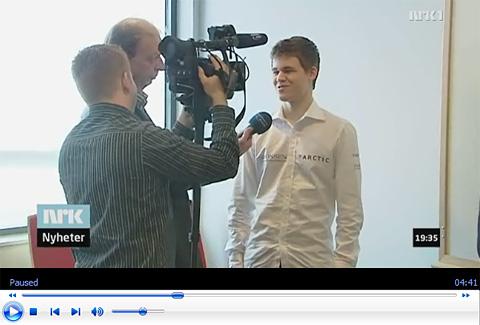
Q: "Do you feel that people has stopped regarding you as a kid?" Magnus: "Well, I hope this has been the case for a long time already. I've played at a reasonably high level for some six years now, and I've had to perform and behave as an adult in many situations. I hope people have seen me as such as well."
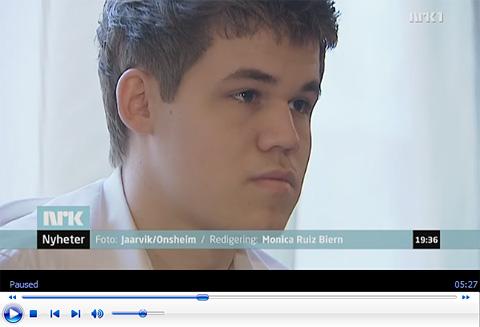
"Garry has helped me a lot really. Not the least in the opening phase, where he was the greatest expert in the world, but also in the area of psychology." Q: "Is your next goal to become World Champion?" Magnus: "Of course that is a goal, but it is not something I think about every day. It is not an all-consuming goal. I feel it will just be a natural step at some point in time."
Do góry
|
|
|
|
|
